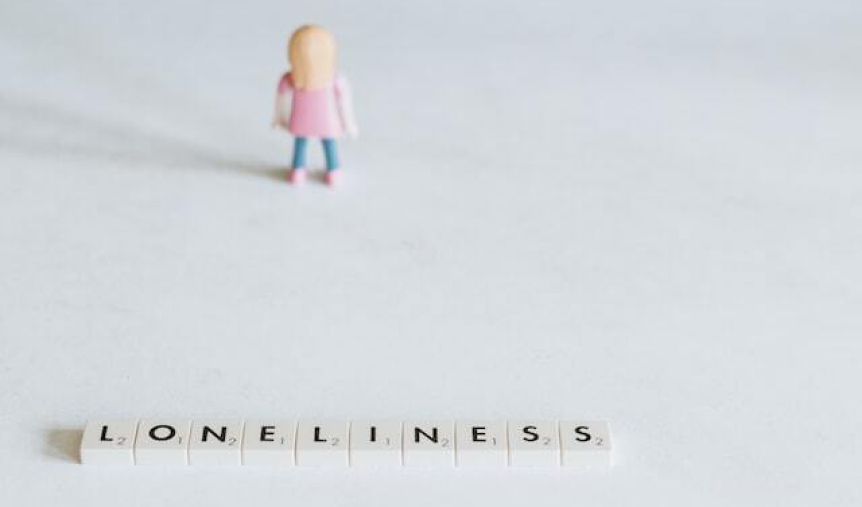If you’re lonely and feel uncomfortable sharing this information, you are in good company. In 2018, BBC Radio 4’s program “All in the Mind” conducted The Loneliness Experiment in collaboration with researchers from The University of Manchester, Brunel University London and Exeter University. More than 55,000 people worldwide responded to the survey making The Loneliness Experiment the largest-ever study of loneliness (Manchester Institute of Education, 2018).
The Stigma and Shame of Loneliness
The psychologists devising the questionnaire did something particularly interesting. They avoided using the words lonely or loneliness in some of the questions, and something curious happened. 30% of respondents who said they were ‘never lonely’ changed their answer when the question was asked a different way, such as whether they would like some company. These results demonstrate that many of us do not want to admit feeling lonely (Manchester Institute of Education, 2018). But why exactly?
The survey revealed higher levels of shame among people who acknowledged their loneliness. This tells us something that we probably already know intuitively; there is a stigma surrounding the experience of loneliness (Lau & Gruen, 1992). The US Surgeon General, Dr Vivek Murthy, puts it this way:
“People who feel lonely often are ashamed to admit it. They think it’s equivalent to admitting that they are not likable or that they’re socially insufficient in some way” (Suttie, 2020)
Loneliness defined
We all have a sense of what loneliness is, either from our own experience, that of those close to us, or from representations in books, movies, television, news and other forms of mass media. According to one of the researchers behind the BBC Loneliness Experiment, Professor Pamela Qualter, “what’s really striking is that people are saying loneliness is emptiness, it’s about being disconnected” (BBC Radio 4, 2018).
People who participated in The Loneliness Experiment said that loneliness is:
- “Having nobody to talk to
- Feeling disconnected from the world
- Feeling left out
- Sadness
- Not feeling understood” (Hammond, 2018a).
While it is tempting to think of loneliness as a modern-day issue, this topic has been explored by philosophers, poets, mystics and scholars for thousands of years. In the twentieth century, social scientists, psychologists and psychiatrists began to scientifically study this deeply human experience. Most recently, researchers in a new discipline called social neuroscience have turned their attention to loneliness. Social neuroscientists seek to understand how the brain mediates social processes and behavior (Nature portfolio, n.d.).
Loneliness according to researchers
It is useful to consider definitions from prominent loneliness researchers, in addition to what the general public understands loneliness to be, to develop a more comprehensive understanding of the phenomenon. Loneliness has variously been defined as:
“…the exceedingly unpleasant and driving experience connected with inadequate discharge of the need for human intimacy, for interpersonal intimacy” (Sullivan, 1953)
Loneliness is caused not by being alone… Loneliness appears always to be a response to the absence of some particular type of relationship or, more accurately, a response to the absence of some particular relational provision” (Weiss, 1973)
“…the discrepancy between a person’s desired and actual social relationships… loneliness reflects perceived social isolation” (Masi et al., 2011)
“A subjective unpleasant or distressing feeling of a lack of connection to other people, along with a desire for more, or more satisfying, social relationships” (Badcock et al., 2022).
“Formal definitions of loneliness vary but typically share two common elements: an emotional component (i.e., the feeling is unpleasant, unwelcome, distressing) and a social cognition component (i.e., the perception of being disconnected from other people along with a desire to be more connected)” (Badcock et al., 2022).
Thus, according to the research, loneliness:
- is driven by our human need to connect with one another
- produces negative emotions
- is a subjective state that depends on our perceptions and cognition (thinking)
Loneliness, social isolation and solitude
Researchers differentiate between social isolation and loneliness. Social isolation “involves the complete, or near complete, lack of contact with other people” (Ending Loneliness Together, 2021a). Social isolation is an objective state because we can count the number of relationships we have and how often we are in contact with our network. By contrast, loneliness is a subjective state reflecting our perception of being isolated (Masi et al., 2011). This may seem like semantics, but the difference is an important one.
Because loneliness is a subjective experience, it is not easy to know who is (or isn’t) lonely (Ending Loneliness Together, 2021a). Loneliness is about feeling alone (J. T. Cacioppo et al., 2015) whereas social isolation is about actually being alone (AIHW, 2022). Clearly we can experience loneliness when we are by ourselves, but we can also feel lonely in a crowd, in our marriage or intimate relationship, when hanging out with our family, while socializing with friends, or at work (Heinrich & Gullone, 2006). As comedian Robin Williams said in the 2009 film World’s Greatest Dad: “I used to think the worst thing in life was to end up all alone. It’s not. The worst thing in life is to end up with people who make you feel all alone” (S. Cacioppo et al., 2015; Evon, 2020).
Another emerging phrase in the scientific literature is social disconnection. This is an umbrella term covering both objective and subjective isolation, that is, social isolation and loneliness. The opposite is social connection, which the Global Initiative on Loneliness and Connection defines as: “…having a variety of relationships (from close personal ties such as family and friends through to weaker ties such as acquaintances and strangers); relationships you can rely upon for support; and relationships that are trusted, high quality, and satisfying.”
Not everyone feels lonely when they are alone (Spithoven et al., 2019). This state is more typically referred to as solitude (S. Cacioppo et al., 2015). Whilst loneliness and social isolation are negative experiences, solitude is often an enjoyable state used for relaxation and personal growth. Although spending time in solitude involves a temporary lack of contact with people, it does not necessarily indicate social disconnection (Badcock et al., 2022).
Tackling loneliness: Collective solutions
The good news is that a conversation about loneliness has begun globally. In 2011 the UK launched The Campaign to End Loneliness and in 2018 appointed a Minister for Loneliness (UK Government, 2018). The charitable organization Loneliness NZ (New Zealand) began operating the same year (Loneliness NZ, 2019). 2020 was a significant year for discussions around loneliness, no doubt in part due to the devastating effect the COVID-19 pandemic had on our social lives. In Australia, a national network of universities and industry partners called Ending Loneliness Together formed (Ending Loneliness Together, 2022).
In the United States, Dr Vivek Murthy brought attention to the importance of social connections through the publication of his book Together (Murthy, 2020) and the Coalition to End Social Isolation & Loneliness (n.d.) was formed. Finally, the Crown Princess Mary of Denmark’s foundation began a campaign to break the taboo surrounding loneliness in young people (The Mary Foundation, 2020). On January 1, 2021 the Global Initiative on Loneliness and Connection (GILC) was established with membership organizations spanning North America, South America, Europe, Asia and the Pacific (Global Initiative on Loneliness and Connection, n.d.).
In Australia there have also been calls for a national strategy to address loneliness and social isolation. Here’s an excerpt from the submission:
“The evidence highlights that in order to tackle loneliness effectively, there is a need to lift the stigma associated with it. Such efforts need to begin by improving community understanding and challenging public misconceptions about loneliness” (Ending Loneliness Together, 2021b).
References:
- AIHW. (2022). Social isolation and loneliness. Australian Government, Australian Institute of Health and Welfare. Retrieved 23 June 2022 from https://www.aihw.gov.au/reports/australias-welfare/social-isolation-and-loneliness-covid-pandemic
- Badcock, J. C., Holt-Lunstad, J., Garcia, E., Bombaci, P., & Lim, M. H. (2022). Position Statements on Addressing Social Isolation and Loneliness and the Power of Human Connection. https://www.gilc.global/_files/ugd/410bdf_74fffc2d18984b0e8217288b1b12d199.pdf
- BBC Radio 4. (2018). The Loneliness Experiment In All in the Mind. https://www.bbc.co.uk/programmes/b09r6fvn
- Cacioppo, J. T., Cacioppo, S., Cole, S. W., Capitanio, J. P., Goossens, L., & Boomsma, D. I. (2015). Loneliness Across Phylogeny and a Call for Comparative Studies and Animal Models. Perspectives on Psychological Science, 10(2), 202-212. https://doi.org/10.1177/1745691614564876
- Ending Loneliness Together. (2021a). A Guide to Measuring Loneliness for Community Organisations. https://endingloneliness.com.au/wp-content/uploads/2021/08/A-Guide-to-Measuring-Loneliness-for-Community-Organisations_Ending-Loneliness-Together.pdf
- Ending Loneliness Together. (2021b). A National Strategy to Address Loneliness and Social Isolation: Pre-Budget Submission 2021-2022. https://treasury.gov.au/sites/default/files/2021-05/171663_ending_loneliness_together.pdf
- Ending Loneliness Together. (2022). About Us. Retrieved 24 June 2022 from https://endingloneliness.com.au/about-us/
- Evon, D. (2020). Did Robin Williams Say the ‘Worst Thing in Life is Ending Up With People Who Make You Feel All Alone’? Retrieved 20 June 2022 from https://www.snopes.com/fact-check/robin-williams-worst-thing-in-life/
- Hammond, C. (2018a). The Anatomy of Loneliness: Who feels lonely? The results of the world’s largest loneliness study. BBC Radio 4. Retrieved 24 June 2022 from https://www.bbc.co.uk/programmes/articles/2yzhfv4DvqVp5nZyxBD8G23/who-feels-lonely-the-results-of-the-world-s-largest-loneliness-study
- Heinrich, L. M., & Gullone, E. (2006). The clinical significance of loneliness: a literature review. Clin Psychol Rev, 26(6), 695-718. https://doi.org/10.1016/j.cpr.2006.04.002
- Lau, S., & Gruen, G. E. (1992). The Social Stigma of Loneliness: Effect of Target Person’s and Perceiver’s Sex. Personality and Social Psychology Bulletin, 18(2), 182-189. https://doi.org/10.1177/0146167292182009
- Manchester Institute of Education. (2018). The BBC Loneliness Experiment. Retrieved 22 June 2022 from https://www.seed.manchester.ac.uk/education/research/impact/bbc-loneliness-experiment/
- Masi, C. M., Chen, H.-Y., Hawkley, L. C., & Cacioppo, J. T. (2011). A meta-analysis of interventions to reduce loneliness. Personality and social psychology review : an official journal of the Society for Personality and Social Psychology, Inc, 15(3), 219-266. https://doi.org/10.1177/1088868310377394
- Murthy, V. (2020). Together : the healing power of human connection in a sometimes lonely world. Harper Wave, an imprint of HarperCollinsPublishers.
- Nature portfolio. (n.d.). Social neuroscience. Retrieved 28 June 2022 from https://www.nature.com/subjects/social-neuroscience
- Spithoven, A. W. M., Cacioppo, S., Goossens, L., & Cacioppo, J. T. (2019). Genetic Contributions to Loneliness and Their Relevance to the Evolutionary Theory of Loneliness. Perspect Psychol Sci, 14(3), 376-396. https://doi.org/10.1177/1745691618812684
- Sullivan, H. S. (1953). The interpersonal theory of psychiatry. Norton.
- Suttie, J. (2020). How Loneliness Hurts Us and What to Do About It. Greater Good Magazine. Retrieved 5 July 2022 from https://greatergood.berkeley.edu/article/item/how_loneliness_hurts_us_and_what_to_do_about_it
- The Mary Foundation. (2020). New campaign aims to break the the taboo around loneliness among young people. Retrieved 24 June 2022 from https://www.maryfonden.dk/en/new-campaign-aims-to-break-the-the-taboo-around-loneliness-among-young-people/
- Weiss, R. S. (1973). Loneliness: The experience of emotional and social isolation. MIT Press.



